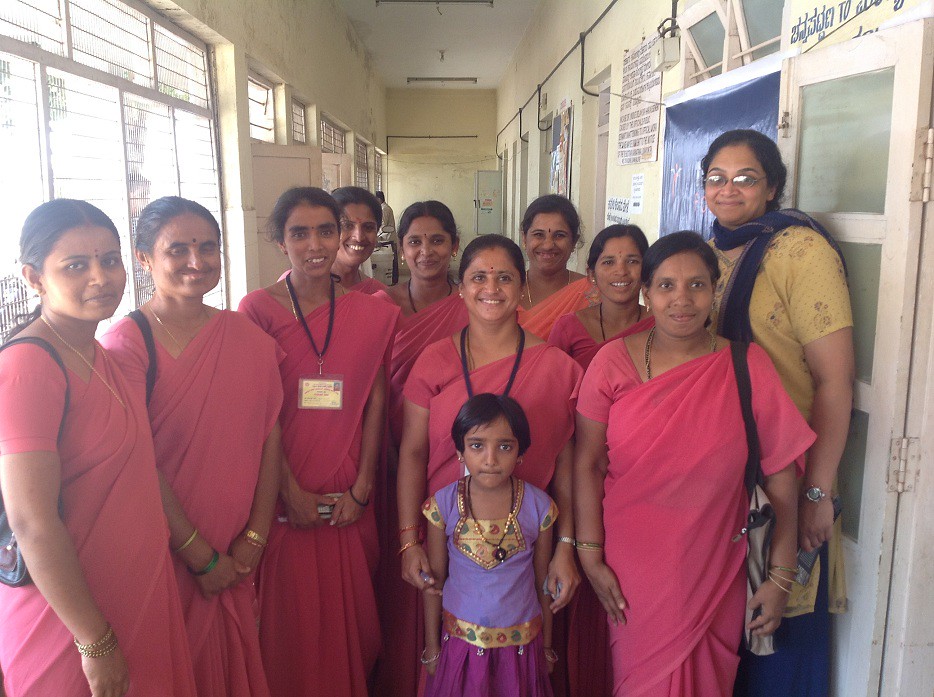ASHAs have a long list of tasks. Post-natal care, gathering sex behaviour details, birth and death details, polio vaccinations, family planning interventions, monitoring TB treatment. Every task has a side ASHA story.
Sitting with a group of ASHA workers in a rural area is a revelation of the health addressal system in India. Sheetal, Yogita, Bhumika, Rakhi (names changed) work in a common block area of a district. They are among the over 10 lakh (one million) ASHA workers across India.
Their profile is worthy of mention. Sheetal has an MA in Sociology, so does Yogita. While Bhumika has studied up to Class VIII and Rakhi up to Class X. They have been “elected” by community consensus. The process entails registering your name. If there is a competitor, the community makes the final choice.
It is interesting to note one word in the full form of ASHA—Accredited Social Health ACTIVIST. Activist is now colloquially associated with news breakers, who make headlines with protests, marches, petitions and public interest litigations.
Well, a while ago, ASHA workers did make headlines when the World Health Organisation lauded their work as frontline healthcare workers in India. The rest is hardly “breaking” news. Unless certain basics about their “frontline” work are understood and appreciated.
The portfolio of an ASHA is complex to say the least. The government has struggled with the “right” payment structure or mechanism for them. The work of ASHAs started in 2006.The rest speaks for itself.
Institutional delivery means ensuring a woman safely delivers her baby under proper care in a medical institution. In 2005-6, about 41% of all deliveries in India were so. By 2019-21, it was over 88%.
As Sheetal explained, “We have to keep track of a pregnant woman right from the start…ensuring her injections, registration at the hospital, regular check-ups, advising and monitoring her diet, making sure the family provides it.
“Then we have to be available to take her to the hospital when she goes into labour. It can be in the middle of the night, it can be raining…Very often the family or my husband gets upset, but, it’s my job.”
In a rural area, the ASHA gets Rs 600 for “achieving the target” of an institutional delivery. With the caveat, if it is in a government hospital with records.
Rakhi interrupts: “The problem is, we take care for nine months of her pregnancy. Nowadays, in the end, many go to a private hospital without even informing. So, we do all the care work right through but get nothing in the end.”
The statistics of Maternal Mortality Rate are a key index of development. Before ASHAs started work, it was 254 in 2004-6. It already drops to 212 in 2007-9. By 2017-19, it is 103, less than half in just over ten years. It is generally calculated that three-fourths of maternal deaths occur in rural areas. ASHAs like Sheetal and Rakhi are the ones who have strived to change that.
Then come vaccinations for newborns and infants, a process of about 18 months. Like Yogita, rural ASHAs get Rs 150 for ensuring all the initial vaccinations for one child. Later there are vaccinations at age 10 and 16, for which there is no payment.
In response to a general query about how much they earn out of institutional deliveries and vaccinations in a year, the answer is simple. Bhumika, though least educated, carries a strong aura of wisdom and commitment. Silent until then, she responds quietly but firmly, “You see, people have become wise…They are limiting their families…which is a good sign for the work we do…but of course, it reduces our earnings!” Then she smiles and shrugs.
ASHAs like Sheetal, Yogita, Bhumika, Rakhi have a long list of tasks. Post-natal care, gathering sex behaviour details, birth and death details, polio vaccinations, family planning interventions, monitoring TB treatment. Every task has a side ASHA story.
During the polio programme week, they could be walking and carrying a bag weighing 10 kilos for about 8 hours. They will be paid Rs 100 a day for 2-3 days of that week—the “actual” number of “recorded” days on the road.
If they successfully counsel a couple for spacing between children or sterilization, it must be accompanied with documents like marriage and birth certificates. Very often marriage certificates are not made or the couple does not share the original even for photocopying. So, there goes an ASHA’s earning of Rs 1,000 per couple. While we trumpet a stabilizing population.
In the case of TB treatment, ASHAs monitor every daily dose of medicine. Finally, they must deposit all medical wrappers to the local health institution before availing Rs 1,000 for the full treatment period.
In all cases, “detailed reports” have to be submitted. Sometimes, they do not receive a payment for 4-5 years, sometimes “not to date” as Yogita vehemently points. Her point is, “By the time our voice or complaint is heard, the project period is over!”
In this scenario, a rural ASHA gets a “motivational salary” of Rs 2,000, to which an additional Rs 1,000 was added during Covid. It is unclear whether the latter will continue. Taking all into account, a rural ASHA earns a cumulative monthly average of about Rs 4,000. For taking care of the MMR, IMR indexes, providing key data for national surveys and providing doorstep health assistance. She is the frontline ACTIVIST, after all.
Neelima Mathur is an India-based Executive Producer, Researcher, Writer, Mentor and Trainer for documentary and NGO films. She is also Festival Director of the Lakeside Doc Festival.

